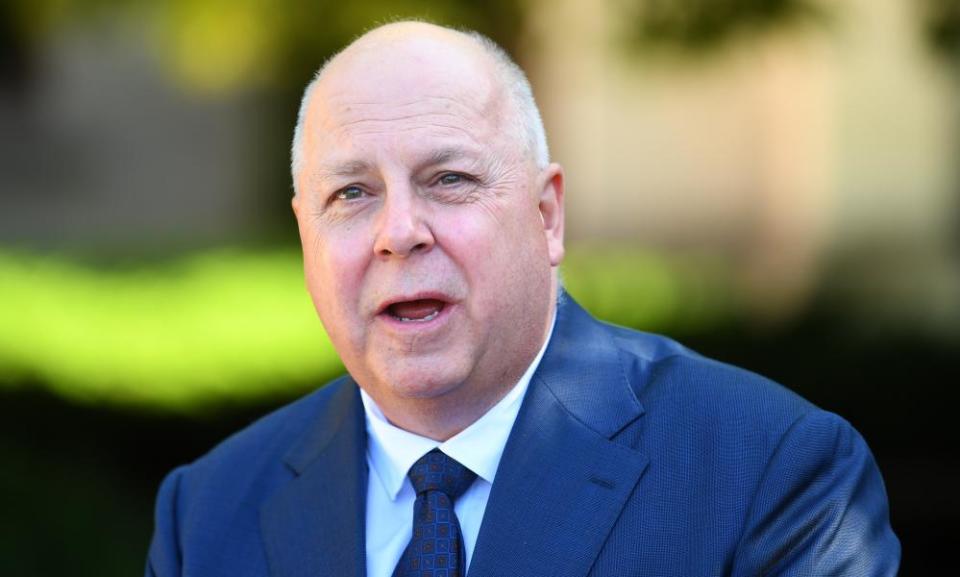Victorian treasurer takes swipe at ‘elitist’ men’s only clubs as budget lifts property taxes

The Victorian government has taken a swipe at exclusive men’s only clubs, announcing plans to strip them of land tax concessions traditionally afforded to charities and social associations.
Victoria’s treasurer, Tim Pallas, is preparing to deliver the state’s 2021 budget next Thursday, and staring down an eye-watering bill from the devastating Covid-19 second wave. In order to raise revenue Pallas has announced new land tax measures, expected to bring in an extra $2.7bn over the next four years.
One of these new announcements is the removal of concessions to single-gender men’s and women’s social clubs like the Melbourne Club, Australian Club and Athenaeum Club.
Related: Queensland’s ex-top cop blasts corruption watchdog over claims of discrimination against men
These exclusive organisations, made up of invite-only members from the upper echelons of Melbourne society, are generally in prime CBD locations, but up until now have not had to pay regular land taxes as they enjoyed the same exemption as other non-for-profit social clubs.
“The days of giving elitist organisations like the Melbourne Club the luxury of a land tax concession are over,” Pallas said on Saturday.
In his statement announcing the rule changes, Pallas said “for too long, private gender-exclusive clubs have benefited … while discriminating against half the population”.
A spokesperson from Pallas’s office confirmed to Guardian Australia the measure would also apply to exclusive women’s only clubs like the Alexandra or Lyceum clubs, but would only target private member organisations, so bodies such as the Country Women’s Association would be spared.
Single-gender societies, particularly the men’s only clubs, have fallen out of favour in recent years. In March a group comprised of key supporters of the Melbourne Football Club was criticised after the ABC reported they were organising a season launch event at the Australian Club. This venue has exclusively male membership, although women are now allowed into the building as guests.
The then chief executive of Respect Victoria, Tracey Gaudry, slammed the decision, telling ABC it “sends a message to women and gender diverse players and fans that they are not unconditionally welcome”.
Membership to these societies was also a contentious issue in last year’s Victoria Bar Association elections, with several newly elected council members declining to answer questions surrounding membership to men-only clubs in a candidate questionnaire.
However, the Victorian governments move is largely symbolic with the new tax measure forecast to raise just $1m over the next four years, with the bulk of the $2.7bn in revenue to come from other rule charges targeting the top tier of landowners in the state.
Among these is a “windfall gains tax” on property developers who often make huge profits overnight when ex-industrial land is rezoned to allow for it to be turned into residential estates.
The new measure will raise $40m a year, with the money to be invested in public transport, schools and other community needs.
Pallas said this would make Victoria’s tax system “fairer and more progressive” and was consistent with reforms being brought in by the US president, Joe Biden, to “mobilise new revenue from those in the best position to contribute”.
Taxes on large land holdings will also increase to raise more than $380m a year. From 1 January 2021 the land tax rate will rise by 0.25 percentage points for taxable landholdings worth more than $1.8m and by 0.30 percentage points for those exceeding $3m.
Stamp duty on properties worth more than $2m will also increase, raising an extra $137m a year on average.
Asked by reporters if the government was unfairly taxing the rich, Pallas said those with the capacity to provide were being required to make a “modest contribution” for a more cohesive community.
“I’ve never been one to increase a tax simply for the thrill of it,” he said.
While the property industry was hit hard in the early phase of the pandemic – for which it received ample government support – there had since been a “massive bounce back” of wealth accumulation at the top end of the market, he explained.
The Melbourne Club and Alexandra Clubs declined to comment on the rule changes.

 Yahoo Movies
Yahoo Movies 